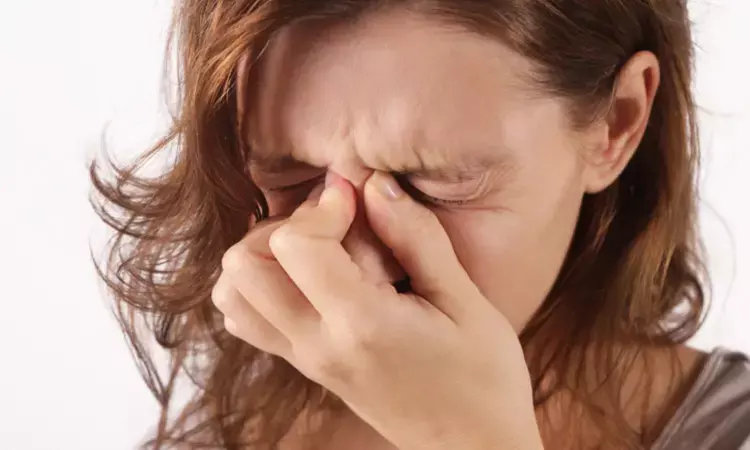- Home
- Medical news & Guidelines
- Anesthesiology
- Cardiology and CTVS
- Critical Care
- Dentistry
- Dermatology
- Diabetes and Endocrinology
- ENT
- Gastroenterology
- Medicine
- Nephrology
- Neurology
- Obstretics-Gynaecology
- Oncology
- Ophthalmology
- Orthopaedics
- Pediatrics-Neonatology
- Psychiatry
- Pulmonology
- Radiology
- Surgery
- Urology
- Laboratory Medicine
- Diet
- Nursing
- Paramedical
- Physiotherapy
- Health news
- Fact Check
- Bone Health Fact Check
- Brain Health Fact Check
- Cancer Related Fact Check
- Child Care Fact Check
- Dental and oral health fact check
- Diabetes and metabolic health fact check
- Diet and Nutrition Fact Check
- Eye and ENT Care Fact Check
- Fitness fact check
- Gut health fact check
- Heart health fact check
- Kidney health fact check
- Medical education fact check
- Men's health fact check
- Respiratory fact check
- Skin and hair care fact check
- Vaccine and Immunization fact check
- Women's health fact check
- AYUSH
- State News
- Andaman and Nicobar Islands
- Andhra Pradesh
- Arunachal Pradesh
- Assam
- Bihar
- Chandigarh
- Chattisgarh
- Dadra and Nagar Haveli
- Daman and Diu
- Delhi
- Goa
- Gujarat
- Haryana
- Himachal Pradesh
- Jammu & Kashmir
- Jharkhand
- Karnataka
- Kerala
- Ladakh
- Lakshadweep
- Madhya Pradesh
- Maharashtra
- Manipur
- Meghalaya
- Mizoram
- Nagaland
- Odisha
- Puducherry
- Punjab
- Rajasthan
- Sikkim
- Tamil Nadu
- Telangana
- Tripura
- Uttar Pradesh
- Uttrakhand
- West Bengal
- Medical Education
- Industry
Tezepelumab therapy reduces size of nasal polyps, severity of nasal congestion and sinonasal symptoms: Study

A new study published in The New England Journal of Medicine showed that tezepelumab dramatically decreased the size of the nasal polyps, congestion, and the intensity of the symptoms in people with severe chronic rhinosinusitis with nasal polyps.
1-5% Americans suffer with chronic rhinosinusitis and it could drastically lower life quality. In addition to objective evidence, the persistence of at least 2 of the 4 cardinal symptoms, facial pain/pressure, hyposmia/anosmia, nasal discharge, and nasal obstruction, for at least 12 weeks in a row is what defines chronic rhinosinusitis.
In individuals with severe, uncontrolled asthma with a history of chronic rhinosinusitis with nasal polyps, tezepelumab has proven successful in treating sinonasal symptoms. However, its effectiveness and safety in treating adults with severe, uncontrolled chronic rhinosinusitis with nasal polyps are uncertain. Thus, this study by Brian Lipworth and team evaluated the effectiveness of tezepelumab in treating severe chronic rhinosinusitis with nasal polyps.
Adults with a clinically-diagnosed, symptomatic, severe chronic rhinosinusitis with nasal polyps were randomly allocated to receive conventional therapy and either tezepelumab (210 mg) or a placebo subcutaneously every 4 weeks for 52 weeks. The changes from baseline in the mean nasal-congestion score (range, 0 to 3; higher scores indicate more severity) and the total nasal-polyp score (range, 0 to 4 [for each nostril]) at week 52 were the coprimary end goals.
The Lund-Mackay score (range: 0 to 24; higher scores indicate greater severity), the loss-of-smell score, the Sinonasal Outcome Test (SNOT-22; range: 0 to 110; greater scores suggest greater severity), the total symptom score (range: 0 to 24; higher scores suggest greater severity), and the initial decision to treat with nasal-polyp surgery, systemic glucocorticoid therapy, or both were evaluated in time-to-event analyses (individual and composite).
A total of 205 individuals were given a placebo and 203 patients were given tezepelumab. Both the mean nasal-congestion score and the total nasal-polyp score significantly improved in the tezepelumab-treated individuals at week 52. The loss-of-smell score, SNOT-22 total score, Lund–Mackay score, and overall symptom score were all markedly enhanced by tezepelumab.
Much fewer patients in the tezepelumab group (0.5%) than in the placebo group (22.1%) required surgery for nasal polyps, and tezepelumab-treated patients used systemic glucocorticoids much less frequently (5.2%) than placebo-treated patients (18.3%) (P<0.001 for both time-to-event analyses). Overall, in people with severe, uncontrolled chronic rhinosinusitis with nasal polyps, tezepelumab treatment resulted in considerably larger decreases in nasal polyp size, nasal congestion severity, sinonasal symptoms, nasal-polyp surgery, and systemic glucocorticoid usage than placebo.
Source:
Lipworth, B. J., Han, J. K., Desrosiers, M., Hopkins, C., Lee, S. E., Mullol, J., Pfaar, O., Li, T., Chen, C., Almqvist, G., Margolis, M. K., McLaren, J., Jagadeesh, S., MacKay, J., Megally, A., Hellqvist, Å., Mankad, V. S., Bahadori, L., & Ponnarambil, S. S. (2025). Tezepelumab in adults with severe chronic rhinosinusitis with nasal polyps. The New England Journal of Medicine. https://doi.org/10.1056/nejmoa2414482
Neuroscience Masters graduate
Jacinthlyn Sylvia, a Neuroscience Master's graduate from Chennai has worked extensively in deciphering the neurobiology of cognition and motor control in aging. She also has spread-out exposure to Neurosurgery from her Bachelor’s. She is currently involved in active Neuro-Oncology research. She is an upcoming neuroscientist with a fiery passion for writing. Her news cover at Medical Dialogues feature recent discoveries and updates from the healthcare and biomedical research fields. She can be reached at editorial@medicaldialogues.in
Dr Kamal Kant Kohli-MBBS, DTCD- a chest specialist with more than 30 years of practice and a flair for writing clinical articles, Dr Kamal Kant Kohli joined Medical Dialogues as a Chief Editor of Medical News. Besides writing articles, as an editor, he proofreads and verifies all the medical content published on Medical Dialogues including those coming from journals, studies,medical conferences,guidelines etc. Email: drkohli@medicaldialogues.in. Contact no. 011-43720751


